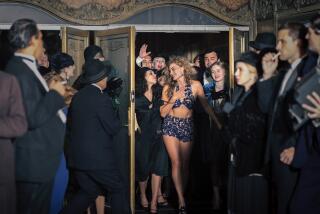FILM : Garbo Laughs at Herself in ‘Ninotchka’
- Share via
Almost the first words out of Greta Garbo’s mouth in “Ninotchka” are “Don’t make an issue of my womanhood.”
Which is just what director Ernst Lubitsch does for the next two hours in this breezy 1939 comedy hit, which screens at the Wilshire Auditorium on Friday night.
As the title character, the “envoy extraordinary” sent to Paris by the Soviets to straighten out three of her comrades, Garbo is the moth who changes into a butterfly. Whom better to see transformed than the luminous Garbo? Her beauty is lyrical.
Lubitsch overturns all that in the movie’s first half, only to dazzle us with it later; he both mocks and embraces Garbo’s cinema image. His Ninotchka is a severe, robotic bureaucrat who wears dull clothes, talks in a monotone and believes steadfastly in the Communist line. In defending Stalin’s purges, she says blithely, “There are going to be fewer but better Russians!”
A playboy (Melvyn Douglas, approaching the role like a sailor on holiday) provides the cocoon with all his amorous attention. He uses glittering small talk (Billy Wilder, Charles Brackett and Walter Reisch wrote the script) to get past her suspicions. After much coaxing, Ninotchka drops the uniform for a low-cut evening gown and is drinking champagne like a practiced bon vivant.
Lubitsch’s characteristically stylish construction is on display. The director known for the wonderful “Trouble in Paradise,” among others, gives a second tier to “Ninotchka” that lets Garbo’s supporting cast have a lot of fun. Her three comrades (Felix Bressart, Alexander Granach and Sig Rumann) are like the Russian Three Stooges, letting the simplest situation become a comic foil.
The ongoing gag comes from how easily they’re seduced by the decadent West. Within minutes of arriving in Paris--their mission is to sell the royal jewels to buy food for Soviet peasants--they’re wooed by the opulence. They rationalize staying in the best hotel’s best suite: “You can’t afford to live in a cheap hotel. Doesn’t the prestige of the Bolsheviks mean anything to you?” they imagine Lenin whispering to them.
“Ninotchka’s” symmetry is also found in Douglas’ response to Garbo. While she’s transforming, he changes as well. He starts reading Marx, begins to worry about the proletariat (he makes his own bed, which horrifies the butler) and isn’t so glib anymore. They’re both altered by love, and it’s a pleasure to watch.
Lubitsch accomplished something special in “Ninotchka”: he made a topical satire of the hard Soviet way of life contrasted with the silliness of the luxurious West, all the while putting Garbo on a pedestal that allows both admiration and laughter.
What: Ernst Lubitsch’s “Ninotchka.”
When: Friday, March 22, at 7:30 p.m.
Where: The Wilshire Auditorium, 330 N. Lemon St., Fullerton.
Whereabouts: Take the Riverside Freeway to Lemon Street and head north.
Wherewithal: $4 and $5.
Where to Call: (714) 871-4030, Ext. 15.
More to Read
Only good movies
Get the Indie Focus newsletter, Mark Olsen's weekly guide to the world of cinema.
You may occasionally receive promotional content from the Los Angeles Times.









